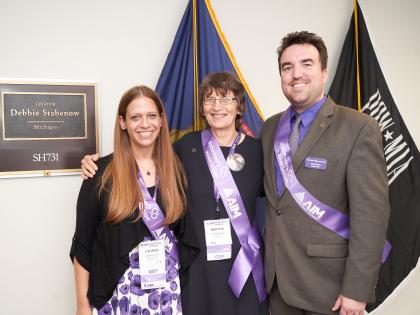Michigan State Alzheimer’s Plan Overview
In 2003, the Michigan Dementia Plan Steering Committee released the state’s first Dementia Plan in partnership with the Department of Community Health. The Committee, which was composed of state agency, academic and advocacy organizations, and health care providers gathered significant stakeholder feedback to issue recommendations around public health, dementia training, caregiver support and access to home- and community-based services (HCBS). The Michigan Dementia Coalition — a collaborative group of community agencies, universities, dementia caregivers, and state government officials concerned about dementia and related conditions — led the development of the Michigan Dementia Plan Update: 2009-2011 and the 2019-2022 Roadmap for Creating a Dementia Capable Michigan. The recent Roadmap calls for increased access to HCBS, support for caregivers and an increase in the number of geriatricians practicing in the state.
Michigan 2026 Policy Priorities
Increasing Funding for the Dementia Unit
Following tremendous advocacy in 2022, state lawmakers allocated $400,000 in funding to make Michigan’s Dementia Unit operational within the Department of Health and Human Services. The Dementia Unit is responsible for coordinating the state’s response to dementia across state government. To ensure the Dementia Unit can continue these efforts and expand services that support people living with dementia and their caregivers, the Alzheimer’s Association is calling on state lawmakers to increase state funding for the Dementia Unit by $2 million annually.

Empowering First Responders with Dementia Training
First responders, such as law enforcement officers, emergency medical services (EMS) workers and firefighters, often interact with people living with dementia while intervening in crisis or disaster situations. Individuals living with Alzheimer’s and other dementia may present as uncooperative when they have difficulty communicating and understanding what is happening, and first responders may not know how to interact with individuals in these situations. The Alzheimer’s Association is calling on state lawmakers to pass legislation requiring annual dementia training for law enforcement officers, firefighters and emergency medical technicians (EMTs).
Requiring Dementia-Specific Training for Guardians
Dementia can significantly affect a person’s ability to make decisions, and in the absence of other advanced directives, people living with dementia may need the assistance of a guardian or conservator. To ensure that the rights, values, and preferences of people living with dementia are upheld under guardianship or conservatorship, the Alzheimer’s Association is calling on state lawmakers to update guardianship statutes to require those who are serving people living with dementia to have training on topics including the progression of the disease, difficult behaviors and effective communication strategies for communicating with a person living with dementia.

Establish a Statewide Alzheimer’s Public Awareness Campaign
With a rapidly growing dementia population, robust public awareness campaigns are needed to raise awareness and mitigate the impact of Alzheimer’s and other dementia. The Alzheimer’s Association is calling on state lawmakers to appropriate $300,000 to establish a public awareness campaign targeting underserved urban and rural populations, where the Alzheimer’s prevalence rate is often higher than the state average.
Michigan State Advocacy Day
Join us to advocate for Michiganders impacted by Alzheimer’s disease and other dementia! Advocates will come together and share their stories with state legislators to urge support for our critical policy priorities and improve the lives of people living with Alzheimer’s and other dementia. Don’t miss this chance to make a difference!
Sign Up to Learn About Advocacy Opportunities in Michigan

Find My Chapter
Together, we’re making an impact. Find an Alzheimer’s Association chapter in your community for more ways to engage.
Contact Us
State Affairs Contact: Lindsey Golden
Phone: 336.814.3723
Email: lagolden@alz.org
202,800
people living with Alzheimer’s in Michigan
385,000
Michiganders are providing unpaid care
$1.9 Billion
Medicaid cost of caring for people living with Alzheimer’s (2025)
155.2%
increase in Alzheimer’s deaths 2000-2022
16%
in hospice with a primary diagnosis of dementia
65.8%
increase of geriatricians in Michigan needed to meet the demand in 2050
Resources to Drive Change in Michigan
The following resources developed by AIM and the Alzheimer’s Association will help you learn more about the issues impacting people living with Alzheimer’s and their caregivers, how Michigan policymakers are addressing these gaps, and how you can help drive change.